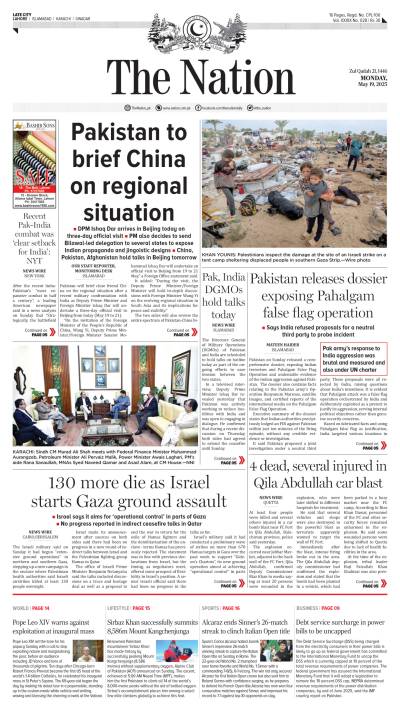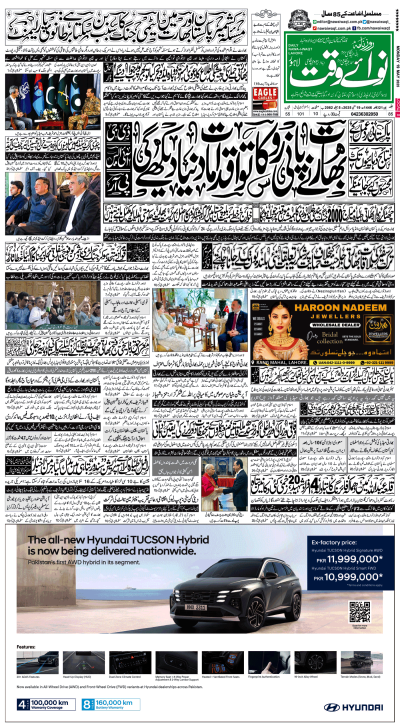The agonising suffering of the people of Kashmir, who have, for the past 60 years, been struggling to gain freedom from India, is a sad and tragic commentary on the state of international conscience. The studied neglect of their plight particularly by powerful states whose clout has global reach comes into sharper focus when they talk of the sanctity of human rights and their resolve to see that the people everywhere realise their democratic aspirations, but turn a deaf ear to the distress signals that have never stopped coming from the occupied state during the past 60 years. India treacherously occupied a major part of the Jammu and Kashmir State in 1948 and refuses to honour its commitment made to Kashmiris as well as the world community at the United Nation Security Council to let the people decide their own fate. It is a great pity that Pandit Nehru, a strong critic of imperialism who toiled hard to gain freedom for India, turned an imperialist at the fag end of his life when he saw that Kashmiris, given the choice between India and Pakistan, would overwhelmingly opt for Pakistan. He adopted all kinds of stratagems to thwart attempts by UN Plebiscite Administrators, special envoys who came to the sub-continent one after the other and tried to pave the way for holding a plebiscite to elicit the wishes of Kashmiris. Finally, Nehru pulled out a trump card of an excuse in Pakistan's joining US-sponsored defence pacts and maintained that 'the situation has changed' and, as a result, New Delhi could not abide by the promises he had personally "solemnly" made to the people of the state and at the UNSC. The idea that the so-called change in the situation could deprive Kashmiris of their birthright of deciding their own future was so outlandishly ridiculous that it defied even the best of political minds. But, strangely, Pandit Nehru felt no qualms in soliciting the Americans' military help in an armed encounter with the Chinese. The governments coming after him have raised fears of the country's disintegration should Kashmiri freedom fighters, whom they call separatists, be allowed to have their say. To cause greater scare in the international community they point to the possibility of bloody disturbances between Muslims and Hindus of India, if the disputed state were to join Pakistan. The clear message, obviously, is that New Delhi would not like to countenance leaving control of the prized land at any cost. Although the people of Kashmir became disillusioned with India, they never gave up hope and launched freedom movement, which has passed through different phases: peaceful, armed and now peaceful again. With the turn of events after 9/11, the world lost sight of the clear-cut, UN-recognised distinction between terrorists and freedom fighters struggling to throw off a crippling yoke of foreign occupation, and the indigenous movement for freedom suffered the unenviable label, with New Delhi emboldened to raise the level of oppression several notches higher. Even the current peaceful phase that began nearly three months ago the Indian brutalities did not abate and nearly 50 have been mowed down. If the Indian security forces have not shown any let-up in their atrocities, Kashmiris have remained equally steadfast in their mission of achieving freedom. Along the way, they have sacrificed at the altar of India's imperialist greed nearly 80,000 of their kith and kin. Many have suffered tortures and mutilations and not a few have simply disappeared. Not a day passes without some of them being shot dead, undergoing torture or going missing. The present scene would provide a glimpse of what has been going on with the daily lives of beleaguered occupied people of the Valley over the years. To quote a 24-year student who spoke to Reuters last Monday, "They beat us, arrest us, kill us, treat us like animals." On that day, October the 6th, the Indian security forces had erected metal barricades and thrown thick nets of barbed wire across the streets of Srinagar to prevent the residents to respond to the call of All Parties Hurryiet Conference, which spearheads the freedom struggle, for holding peaceful protests against India's illegal and forcible occupation at one of the town's main squares, Lal Chowk. Tens of thousand of riot policemen and soldiers patrolled the capital and kept warning the citizens, through loudspeakers and knocks at the doors, of dire consequences should they tried to come out of their houses. Ten districts of the Valley, including Srinagar, were placed under curfew. The top APHC leadership and a large number workers were either taken into custody or put under house arrest. Media was debarred from covering the event and TV channels were only allowed to broadcast songs or show films. In short, the authorities tried their best to scuttle the planned protest. Yet defying these odds, thousands were able to reach the designated site. The security men used all means to deter him and killed at least three and injured several others. One should have expected that the conscience of the world's power brokers would wake up; yet mindless of the Kashmiris' endless agony these powers remained busy currying favour with India and striking deals with it that would have huge financial spin-off and enable them to exploit its fast expanding middle class market. The lesson of history, however, holds out the assurance that, with or without outside intercession, the concerned people, if they are determined to get out of foreign bondage, would ultimately win out. The words of the student who narrated to Reuters cruel treatment at the hands of occupation forces deserve due attention, "Inshallah (God willing) one day Kashmir will win freedom from Indian colonial rule." E-mail: mqkay@yahoo.co.uk
Monday, May 19, 2025
Betraying Kashmiris' just cause
Supreme Court hints at verdict in Zahir Jaffer’s appeal against death sentence
2:22 PM | May 19, 2025
HEC warns public against online scams, fake websites
2:19 PM | May 19, 2025
Karachi cracks down on illegal cattle markets ahead of Eid
2:19 PM | May 19, 2025
PM Shehbaz visits Karachi to honor Navy’s role in Operation Bunyan-un-Marsoos
1:20 PM | May 19, 2025
Recent conflict with Pakistan was ‘clear setback for India’: NYT
1:08 PM | May 19, 2025
-
Lahore emerges among safest global cities in Numbeo 2025 index
-
Lahore emerges among safest global cities in Numbeo 2025 index
-
India’s suspension of Indus Water Treaty legally baseless
-
Seventh polio case reported in Pakistan amid nationwide vaccination drive
-
Pakistan reports sixth polio case of 2025
-
PTA begins issuing VPN licences to regulate usage
Regional Reset
May 19, 2025
Peak Potential
May 19, 2025
United Front
May 19, 2025
Culture Shift
May 18, 2025
Tactical Shift
May 18, 2025
Pakistan’s Strategic Edge
May 19, 2025
Lessons for India
May 19, 2025
Galiyat’s Poor Network Services
May 19, 2025
A City in Neglect
May 19, 2025
Rising Cost of Living
May 19, 2025
ePaper - Nawaiwaqt
Nawaiwaqt Group | Copyright © 2025





